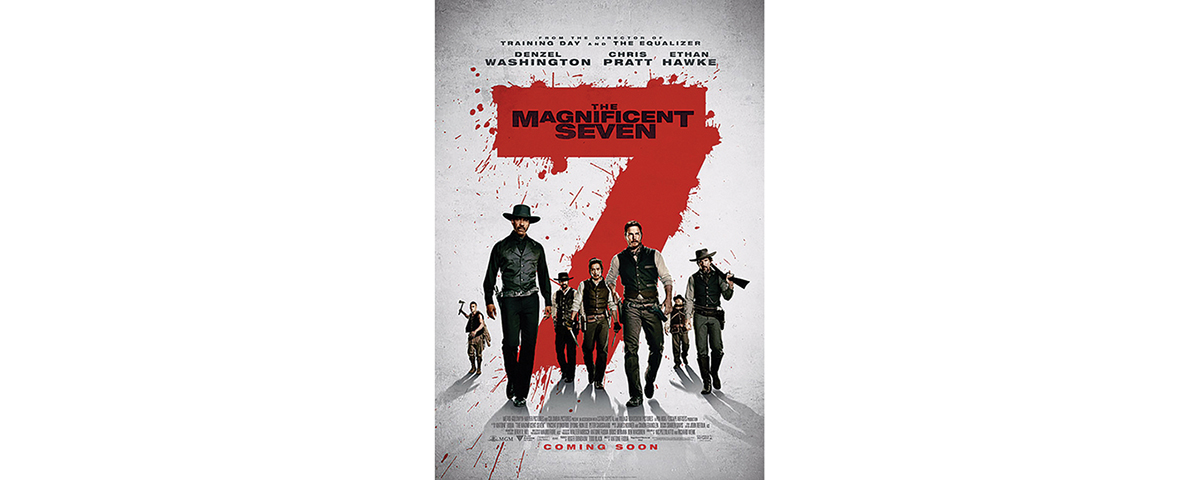The Magnificent Seven, MGM/Columbia Pictures, 133 minutes, 2016
Watching Antoine Fuqua’s remake of The Magnificent Seven, one is reminded how remarkably well John Sturges’ 1960 classic—itself a remake of Akira Kurosowa’s 1954 epic The Seven Samurai—came together. And while comparing the 2016 remake to the 1960 version might be as unfair as comparing the 1960 version to the Kurosowa masterpiece, it remains an unavoidable exercise.
Both English-language versions follow the Kurosowa blueprint—that is, the assembling of a handful of warriors with varied personalities and skill-sets to form a powerful and dynamic team. It’s a structure movie fans have seen replicated countless times over the years, whether in The Guns of Navarone or Inception. In the new Seven it is warrant officer Sam Chisolm (Denzel Washington) who’s recruiting men after a group of homesteaders represented by Emma Cullen (Haley Bennett) seek his help in defending their town from vicious gold baron Bartholomew Bogue (Peter Sarsgaard).
Chisolm proceeds to gather his six sidekicks: first, card shark Joshua Faraday (played by Chris Pratt with his usual brand of earnest buffoonery); second, Goodnight Robicheaux (Ethan Hawke), a Confederate sharpshooter with PTSD; third, Billy Rocks (Byung-hun Lee), Robicheaux’s business partner and a knife aficionado; fourth, Vazquez (Manuel Garcia-Rulfo), a wanted man with whom Chisolm strikes a deal; fifth, Jack Horne (Vincent D’Onofrio), a squeaky-voiced bear of a man; and sixth, Red Harvest (Martin Sensmeier), a Comanche warrior deadly with bow and arrow.
Perhaps the most intriguing aspect of the new crew is its cultural diversity, though the film largely chooses to avoid this topic from a historical perspective. The all-white townspeople never show any prejudices toward their black, American Indian, Mexican or Korean saviors, nor do the seven exhibit much ethnic apprehension toward one another (with the possible exception of the first showdown with Red Harvest). The film, though set during the second half of the 19th century, is deliberately void of racial conflict and envisions something of a colorless utopia.
About three-quarters of the way through the film there’s a wonderful little scene in which Robicheaux reveals his inner demons to Chisolm. It’s a rare moment of true dramatic tension, and Hawke and Washington are given a few brief seconds to shine. One can’t help but react to this scene with lament, wondering why the film isn’t peppered with similar moments. By the time the battle starts, we’ve have barely had the opportunity even to meet the seven guys for whom we’re supposed to root. Lee and D’Onofrio are standouts when given the chance, but their lack of character moments leaves you craving more, while Garcia-Rulfo and Sensmeier simply recede into the background.
There’s a magic number in team movies to allow players adequate screen time, but seven here feels like at least two too many. Sturges’ film achieved a remarkable level of narrative efficiency that proved fundamental to its success and enduring popularity (thanks in part to a wealth of memorable quotes). Each scene fueled the film’s momentum, with seemingly not a wasted line or moment. Missing from this remake are the classic’s blistering pace, snappy dialogue, score (Elmer Bernstein) and comic self-awareness, not to mention the irreplaceable elements like, say, Steve McQueen. The remake plods toward the climactic battle with more gunplay but far less character development.
Thankfully, that confrontation—ironically the great weakness in Sturges’ film, in that it was over before one knew it—is the centerpiece of Fuqua’s version. As Rocks and Horne slice and dice at close quarters, Red Harvest lobs fiery arrows from rooftops, and Chisolm squeezes off miraculous trick shots from horseback, the gunfight feels much larger and more dynamic this time around. As in Sturges’ classic, however, the enemy’s complete and utter incompetence deflates any tension one might have felt. Despite being massively outnumbered, they perform as if “swatting a few flies away from a village,” to quote the original film. Not until badman Bogue wheels out a Gatling gun (which for some reason has the stopping power of a modern-day Browning .50-caliber machine gun) do the seven break a sweat.
During one magnificent scene in the 1960 classic Yul Brynner, Robert Vaughn and Steve McQueen contemplate the essence of a gunfighter: “Home? None.” “People with a hold on you? None.” “Prospects? Zero.” After a while the remake starts to feel a lot like the gunfighter they describe—hollow on the inside.
—Louis Lalire





